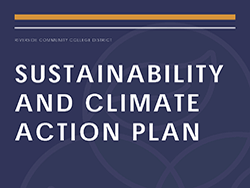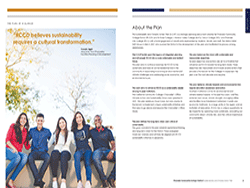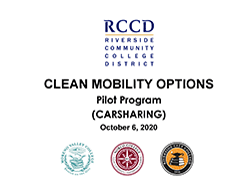Sustainability at RCCD
The Board of Trustees adopted Board Policy 5775 - Sustainability & Environmental Responsibility in January 25, 2011 which states “The Riverside Community College District recognizes its responsibility to exercise environmentall stewardship and to economically manage the use of buildings, land and natural resources. It is the intent of the district to create a set of operating principles and guidelines in the execution of its responsibilities to facilities’ design and operation; campus management and teaching and learning, thereby minimizing negative environmental impacts of activities under its control and oversight.”
Board Policy 5775 - Sustainability & Environmental Responsibility - PDF
Michael Collins
Vice President, Business Services
Travonne Bell
Director of Facilities M&O
Jeff Buch
Classified Representative, CSEA
Associate Professor, Faculty Association
Tonya Huff
Professor, Academic Senate
Bethany Canete
Student Representative, College Students Association
Albert Jaramillo
Student Representative, College Students Association (Alternate)
Kristine DiMemmo
Vice President, Business Services
Robert Beebe
Director of Facilities M&O
Peter Lomas
Classified Representative, CSEA
Kick-off Meetings
The Riverside Community College District started their Sustainability and Climate Action project with a series of kick-off meetings with the District Sustainability Committee and each of the college's President's Cabinets. In these sessions the district's consultant, DLR Group, defined an Integrated Planning Approach, outlined the deliverables and started the process of engagement.- District Sustainability Planning Committee - PDF
- MVC President's Cabinet - PDF
- NC President's Cabinet - PDF
- RCC President's Cabinet - PDF
Values Sessions
In this series of workshops, DLR Group hosted eight sessions of their VALUES workshop. The VALUES framework was developed by DLR Group to uncover stakeholder's priorities towards User Experience and Sustainability. Within the framework there is a variety of topics that allowed stakeholders to prioritize impact areas related to environmental, social and economic sustainability.
- District - PDF
- MVC
- NC
- RCC
Visioning & Listening Sessions (Open House)
During the Open Houses, DLR Group used the District's top VALUES to generate a conversation around Decarbonization and Climate Justice, Recycling and Waste Reduction, Water and Eco-systems and Health and Well-being.
Prioritization Session
In this series of workshops, DLR Group worked with the District Sustainability Committee and sustainability tasks forces or committee at each of the colleges to dig deeper into the goal setting process. DLR Group conducted a crosswalk of sustainability frameworks compared to the VALUES uncovered and then started to outline goals for short, mid and long-term goals around the VALUES or Impact Areas. This series of workshops included Report Out sessions to each college's Resource Council and President's Cabinets summarizing the work of Fall 2021.
-
Group 1 - PDF - 11/1/21
-
Group 2 - PDF - 11/9/21
MVC
- Resources Sub-Committee - PDF
- Sustainability Task Force (Resources Sub-CommIttee) - PDF
- President's Cabinet - PDF
- Resources Council - PDF
- Sustain. Task Force - PDF (Resources Council)
- President's Cabinet - PDF
- College Council - PDF
RCC
District
- District Sustainability Committee: Review Impact Areas - PDF - January
- District Sustainability Committee Review Impact Areas - PDF - February
- District Sustainability Committee Review Impact Areas - PDF - March
- District Sustainability Committee: First Read - April
- FPDC: First Read - April
- District Budget Advisory Council: First Read - May
- District Strategic Planning Council: First Read - May
- Chancellors Cabinet: First Read - May
- Board Committee/Regular Meeting: First Read - June
- Regular Board Meeting: First Read - June
Moreno Valley College
- Strategic Planning Council: First Read - PDF - April
- Student Learning Programs and Services Council: First Read - PDF - April
- Institutional Mission and Effectiveness Committee - April
- Leadership and Governance Committee - April
- Resources Sub-Committee - April
- Sustainability Task Force (Resources Sub-Committee) - PDF - April
- Academic Senate: First Read - April
- Associated Students: First Read - PDF - May
- President's Cabinet: Report Progress - May
Norco College
- President's Cabinet - Report Progress - PDF - March
- Sustainability Task Force - Review Impact Areas - March
- Academic Senate - First Read - PDF - April
- ASNC - First Read - April
- IE and Gov Council - First Read - April
- Student Services Council - First Read - April
- Academic Affairs Council - First Read - April
- Resources Council - First Read - PDF - April
Riverside City College
- President's Cabinet - Report Progress - PDF - April
- Physical Resource Committee - First Read - April
- Sustainability Committee - Review Impact Areas - April
- SAS Leadership - First Read - PDF - April
- Teaching and Learning LC - First Read - Apri
- RD + AS - First Read - April
- EPOC - First Read - May
- ASRCC: First Read - TBD
Additional Meetings
- Total Cost of Ownership Review with VPs - PDF - 01/24/2022
- Water and Eco-system - PDF - 01/27/2022
- Total Cost of Ownership: Model & Framework - PDF - 04/05/2022
California Community Colleges

The Clean Mobility Options (CMO) is part of California Climate Investments, a statewide initiative that puts billions of Cap-and-Trade dollars to work to reduce greenhouse gas emissions, strengthen the economy, improve public health, and improve the environment. CMO aims to improve access to clean mobility options in underserved communities that are safe, reliable, convenient, and affordable to increase mobility equity, improve local air quality, increase zero-emission vehicle adoption, reduce vehicle miles traveled, and advance workforce development in clean transportation.
The CMO Voucher Pilot Program provides funding for zero-emission car sharing, carpooling/vanpooling, bike sharing/scooter sharing, innovative transit services, and ride-on-demand services in California's historically underserved communities.
The District, in collaboration with EViaShare Solutions, LLC, submitted a Community Transportation Needs Assessment (CTNA) application to CMO to access grant funding to conduct a needs assessment of car sharing opportunities at the District's three colleges. On July 30, 2020, the District received notice from CMO that its CTNA application had been approved for funding in the amount of $49,530.
In May 2021, the District conducted two (2) virtual workshops and launched a CTNA Survey - PDF for all students, faculty and staff at District.
Solar Planning Initiative
Board Policy 5775 - Sustainability/Environmental Responsibility - PDF
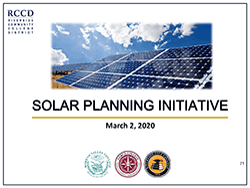
Solar Planning Initiative Approach & Selection Process - PDF
In alignment with Board Policy 5775 - Sustainability/Environmental Responsibility, the District is looking to invest its resources for on‐campus renewable energy sources, specifically, Solar Photovoltaic (PV) System, and develop a districtwide solar plan at all its sites to achieve its economic sustainability, social sustainability, and environmental sustainability goals. This initiative will go in three different phases: Feasibility and Planning, Development, and Execution Phase.
Feasibility and Planning Phase
- FINAL 20210202 - Districtwide Solar Planning Funding Options - BOT Presentation - PDF
- FINAL 20201201 - Districtwide Solar Planning Initiative Update - BOT Presentation - PDF
- DRAFT 20200925 - Districtwide Solar Planning Initiative Update - Conceptual Plan - PDF
- DRAFT 20200818 - Districtwide Solar Planning Initiative Update - Conceptual Plan - PDF
Development Phase/Execution Phase
LEED Certified Buildings
Leadership in Energy and Environmental Design (LEED) is the world's largest rating system for the design, construction and operation of high-performance green buildings. LEED project certification addresses the following elements: integrative process, location and transportation, sustainable sites, water efficiency, energy and atmosphere, materials and resources, indoor environmental quality, innovation and regional priority. LEED certification projects are done through LEED Online which is administered by USGBC.
The following Measure C Bond Construction Projects received LEED Certifications:
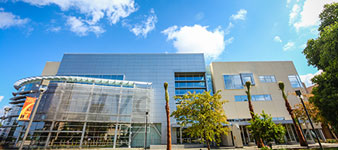
Moreno Valley College
LEED Silver Certification
Occupied: 2013
Architect: DLR Group
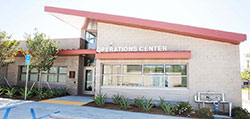
Operations Center
Norco College
LEED Silver Certification
Occupied: 2013
Architect: Hill Partnership

School of Nursing & Math and Science Complex
Riverside City College
LEED Certification
Occupied: 2012
Architect: GKK Works

Henry W. Coil and Alice Edna Coil School of the Arts
Riverside City College
LEED Silver Certification
Occupied: 2016
Architect: LPA, Inc.
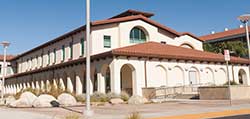
Dr. Charles A. Kane Student Services & Administration Building
Riverside City College
LEED Silver Certification
Occupied: 2016
Architect: HMC Architects
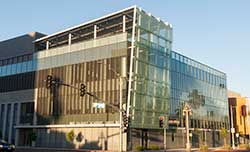
Culinary Arts Academy/District Offices
Riverside City College
LEED Silver Certification
Occupied: 2016
Architects: LPA, Inc.
Prop 39 Plans
Proposition 39, The California Clean Energy Jobs Act, passed by the voters in 2012, provides funding for energy project implementation in the CCC system for qualifying projects. RCCD leveraged $4,484,854 from the State plus additional $228,943 local fund for energy efficacies projects at Moreno Valley College, Norco College and Riverside City College, which have reduced the energy for districtwide facilities by 2,408,756 kW/h annually.


